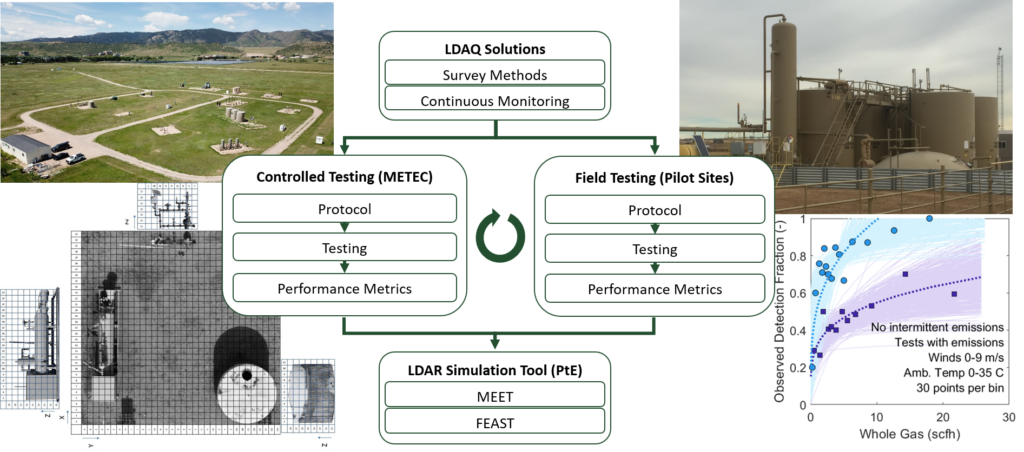Advancing Development of Emissions Detection

Advancing Development of Emissions Detection (ADED)

Summary:
ADED has developed and currently implements two comprehensive protocols to accelerate the adoption of natural gas leak detection and quantification (LDAQ) solutions by natural gas operators, and their approval by cognizant regulatory authorities. The project developed these test protocols for (1) LDAQ continuous monitoring solutions and (2) LDAQ survey solutions to be tested in a controlled yet field representative environment like CSU’s Methane Emissions Technology Evaluation Center (METEC). ADED is currently working towards creating a similar protocol for field testing of solutions after conducting a comprehensive field trial of multiple LDAQ solutions on a variety of oil and gas facilities in 2022 and 2023. ADED is also demonstrating methods that evaluate the control efficacy of LDAQ solutions using simulation software developed in funded, parallel projects. The project is currently moving a set of qualified LDAQ solutions through testing and demonstration, but the primary deliverable is to develop a robust and standardized process whereby any solution can move through testing and qualification.
Objectives:
- Continue testing and improving controlled testing protocols that reliably assess leak detection and quantification (LDAQ) solutions under a range of representative field conditions at a controlled test facility.
- Develop protocols for field trials while continuing comprehensive, multi-solution, field trials across a range of facility types.
- Advance the state of solution testing to be scientifically rigorous, affordable, repeatable, and adaptable to field conditions, and make this knowledge generally available to all stakeholders.
- Propose test standards from the results of objectives 1-3 that can be adopted and adapted by (a) state and federal regulatory agencies for regulatory approval of LDAQ solutions, and by (b) operators for internal emissions-mitigation efforts.
Project Plan:
The ADED project is focused on developing, testing, and improving both the controlled testing and field trials protocols. The implementation of the test protocols does not only show the state-of-art of new generation LDAQ solutions, but it is also a major step towards producing a rigorous, consensus, and technology-independent framework for assessing LDAQ solutions. The development of the test protocols required multistakeholder collaborations which includes oil and gas operators, LDAQ solution developers, regulators, and environmental NGOs. The implementation of the protocols involved the deployment and testing of interested LDAQ solutions at METEC (both continuous monitors and survey systems), and at partner operators’ facilities during field trials. The project sponsors, and both the state and federal regulators have been, and will be, kept updated on project status, milestones achieved, and key lessons learned through regular project-status presentations and meetings. The lessons learned from the assessment of the protocols are shared with the public through a peer-reviewed publication of the blinded performance of participating LDAQ solutions. These lessons inform the revision and subsequent ongoing improvement of these protocols in preparation for the next round of LDAQ solutions testing.
Schedule:
- The first round of the evaluation of controlled testing protocol for continuous LDAQ solutions was in March – October 2021 and February – May 2022. The second round was between February and April 2023.
- The assessment of a similar protocol but for survey LDAQ solutions has been ongoing periodically from 2021 till date.
- The first iteration of field trials of the test protocols ended in February 2023. Plans for the second round of is currently in motion with deployment expected in the next few months.
Accomplishments/Results:
Thus far, ADED has completed controlled release testing of 17 different continuous monitors and at least 12 different survey solutions at METEC. The first round of testing for continuous monitors has been completed with study results peer-reviewed and published. The second round is also completed with findings currently being compiled to be published. Similarly, lessons learned from the implementation of survey test protocol thus far are also being curated to be published. A field deployment was performed in 2022-2023 on four different compressor stations and seven production sites in the Upper Green River, Marcelles, and Permian basins. Across all the sites there were 165 controlled releases of natural gas with 11 solutions participating, not all on every site. During the deployment there were continuous monitoring point sensor (CMPS), camera and laser solutions. For the field deployment a publication is being finalized on the performance of the CMPSs.
Publications:
2024
19 February – Point Sensor Networks Struggle to Detect and Quantify Short Controlled Releases at Oil and Gas Sites
Rachel Elizabeth Day, Ethan Emerson, Clay Bell, Daniel Zimmerle (PDF)
Chiemezie Ilonze, Ethan Emerson, Aidan Duggan, Daniel Zimmerle (PDF)
METEC Continuous Monitoring Testing Publication (Dec 2022)
Opportunities to Participate:
Interested in participating? Here are several ways to get engaged in this project:
- Protocol development committee (PDC) – The PDC is an opportunity for stakeholders of all types to be included in the protocol development for controlled testing.
- Controlled testing – Controlled testing at METEC will be performed following the protocol developed in this project. Contact us at [email protected] for information on how to participate.
- Field test sites – Operators may partner with us to host performers during the field testing. Contact us at [email protected] for information on how to participate.
Project Gallery:
Funding Provided by:
- US Department of Energy – DE-FE0031873
- American Petroleum Institute (The Environmental Partnership)
- BP
- Noble Energy
- Pacific Gas and Electric Company
- Williams
Collaborators
- Harrisburg University of Science and Technology
- University of Texas – Arlington
- University of Texas – Austin
- Southern Methodist University
